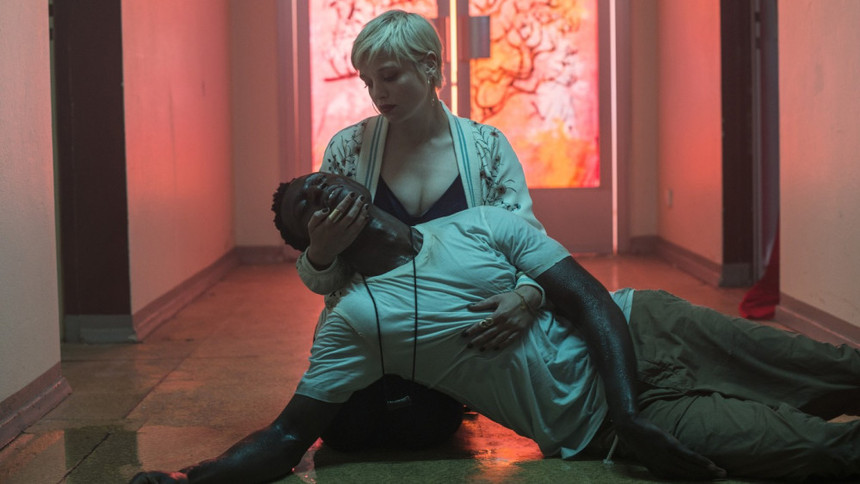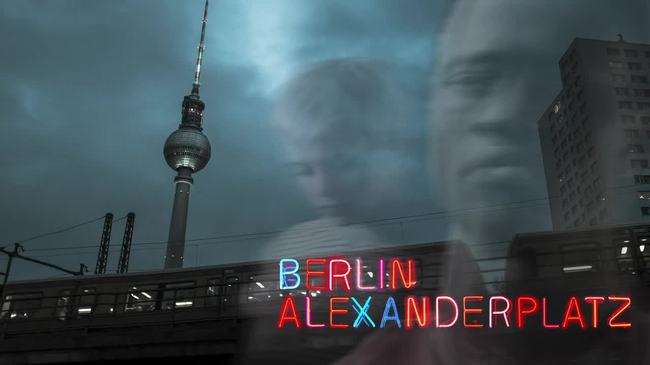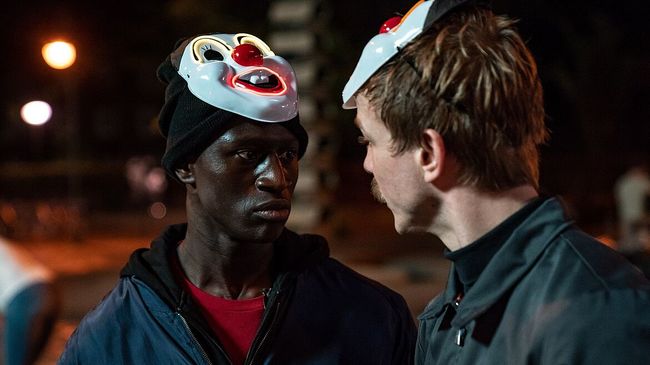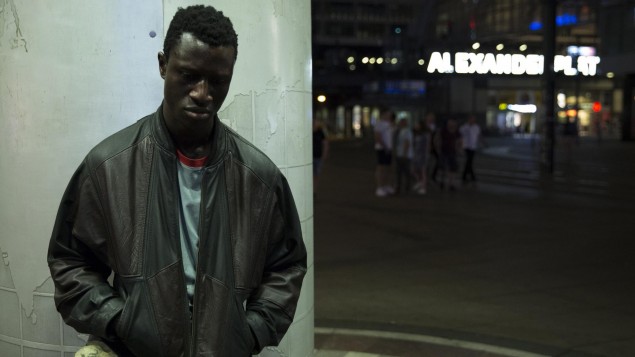Berlinale 2020 Review: BERLIN ALEXANDERPLATZ, A German Version of Hollywood

The latest retelling of Alfred Döblin's 1929 influential and seminal novel Berlin Alexanderplatz, which legendary filmmaker Rainer Werner Fassbinder turned into a celebrated 15-hour miniseries, premiered in the Berlinale's main competition. The rising Afghan-German director Burhan Qurbani, who co-wrote the script with Martin Behnke, delivers a 183-minute long epic melodrama about the fall of a man and his rise in current Germany, framed by the refugee crisis.
The sole survivor of an illegal crossing from Africa, Francis, works as an undocumented laborer living in a shabby lodging-house packed with other African immigrants. The passage to Europe bears a significantly symbolic form as Francis, washed up on a beach in Southern Europe, feels born again and swears off his past, wanting to live the good life onwards.
The omnipresent voice-over of the narrator, a young escort, sports a grandiose delivery as she introduces Francis and prophesizes a thorny path to redemption; it's a myth in the re-making. Human frailties are being exploited and shattered, only to be restored and rectified in an endless cycle.
Francis meets Reinhold, a petty,neurotic drug dealer and compulsive manipulator who eventually desires upward mobility in Berlin's underground food chain. Reinhold, adopting a distorted pose and limping as a way to elicit pity and bait anybody trustful into the tenets of his deception, promises a better and brighter life to young illegals and desperate migrants in the trade of pushing drugs.
Reinhold offers himself as the lesser evil in the shadow economy of Berlin as he observes a strict set of rules: no selling to kids, seniors have discounts, hipsters pay double. Francis, already struggling with inner demons from his previous life in Guinea-Bissau, lets himself get dragged into the bargain with a devil for all the good reasons. Being a born-again good man, Francis refuses to sell drugs but takes the job of a cook for the boys in the field.
Qurbani rehashes a tale as old as mankind, albeit in new, stylish, occasionally neon-lit, clothes. The Faustian myth meets the archetypal fairy-tale-like structure of a man being tested lend Berlin Alexanderplatz the mythopoetic contours of a universal story, wedged into the current social-political climate. Francis errs, then succeeds as an unpredictable prodigy in the shady business, finds love, loses love, falls and rises, dies and is reborn over again in a cyclical narrative design.
An old tale refurbished offers action, comedy, romance, lies, betrayals, unholy alliances, naiveté, and an eons-old legend of good and evil. Berlin Alexanderplatz is a stylish soap opera boiled, adapted and remixed through myths and arch-texts of Judeo-Christian tradition and iconography (pieta as running visual motif, sin and sacrifice as metaphors weaved into the story in different forms and handled as storytelling devices), as well as aspects and patterns from Greek classics. The tension stemming from identity, cultural differences and ambitions, however, remains two-dimensional, as do the most of the characters.
Reinhold is no white savior, neither a Samaritan. He takes, greedily and violently, anything from Francis under the guise of friendship. The minor power he wields makes him a fretful imp, a man-child throwing tantrums to attract attention to his illusory self-importance. Reinhold carved his path to economically better, albeit unlawful, living from faint prospects, and he doesn't hesitate to present himself as a good example of the German dream worthy of following.
But he cannot control himself. On the other hand, Francis' impulsive nature does not need much to get provoked, so he is always walking the tightrope, and not always in an elegant fashion. His journey is one of self-control and self-restraint, a quest to tame the wild beast within himself, nourished by sins of his past.
Berlin Alexanderplatz is a prime example of storytelling as a perfectly-honed craft. The 183-minute running time does not weigh upon the film as the plot barrels forward in carefully built narrative structure and paced events headlined by the charismatic yet occasionally suspiciously naive protagonist portrayed by Welket Bunguê. As much as Berlin Alexanderplatz is an audience-friendly venture catering to a wide demography of viewers despite the unorthodox running time, the story heavily relies on easily-recognized codes, conventions, designs and templates.
The basic narrative framework of rags-to-modest-life leitmotif borrows the best out of gangster movies and an outlier fighting to beat the system whether by virtue of own will or whims of fate. Romantic and bromantic motifs abound as does the action - car chases, heists, turf wars, murders, inner and outer demons, basically the whole inventory of Greek tragedy put into the utilized to produce a perfect commodity.
Besides Burhan Qurbani´s directing chops, the creative team behind the film does its share of heavy lifting. The DoP Yoshi Heimrath with whom has Qurbani already worked aestheticizes, if not fetishizes, the Berlin underbelly with slo-mo neon-lit patina scenes where the form towers over the substance. Philipp Thomas demonstrates high sensibility towards the appropriate pacing swinging from music video rhythm-based editing highlighting Heimrath´s over-stylized camerawork to more introspective moments of Francis´ dilemmas. Their spectrum ranges from night club music videos to kitchen sink talkies.
In a sense, Berlin Alexanderplatz is an exercise in designing of pure archetypal story, needless to say, a highly successful and accomplished exercise. Navigating the shadow economy and society governed by ambitious and toxic criminals and smart and caring escorts, Qurbani delivers more of a popculture product than arthouse fare, the heart-of-gold prostitute trope just one in many rustling in the mixed bag of Berlin Alexanderplatz.
The notion of designer storytelling and filmmaking defines the latest retelling of Berlin Alexanderplatz in regard to its form. The film, being more of an entertainment construction bundling recognizable overt platitudes and universal truths, makes the socio-political discussion it ponders irrelevant. Francis' immigrant and dark past serves merely as an updated element, leaving the topics of identity and heritage outside the equation.
With sex, drugs and rave music added, Berlin Alexanderplatz remains primarily the plight of one man against all odds. It's an archaic story of hope and redemption, repackaged as a darker fairy tale to scrape a bit of privilege -- the pseudo happily-ever-after epilogue leaves little space for imagination -- in a popculture make-over. Burhan Qurbani's latest oeuvre is a German version of Hollywood and maybe even his ticket to the Tinseltown.
Note: Burhan Qurbani is preparing a German version of the Three Colors trilogy as his next project. Each feature film will take one color of the German flag and will revolve around one of the topics of "unity, justice and freedom".










